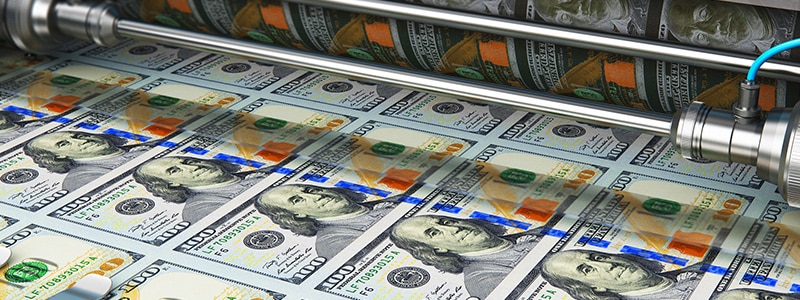COVID-19 stimulus check scams: Frauds target consumers and small businesses
Beware of scams related to COVID-19 stimulus checks the government is sending to Americans. Another target? Small businesses.

Editor’s note: *The Internal Revenue Service and the Treasury Department have started delivering a second round of Economic Impact Payments as part of the Coronavirus Response and Relief Supplemental Appropriations Act of 2021 to millions of Americans who received the first round of payments earlier this year. Here is the original article, including tips on how to avoid coronavirus-related scams.
The threat of COVID-19 has turned life upside down in the United States.
Governors are issuing shelter-in-place orders and enforcing social-distancing measures to help stop the spread of the virus. Restaurants have shut down dine-in services and are focusing only on carry-out or pick-up. And the federal government has negotiated what might be the largest stimulus package in the United States’ history.
This all provides an opportunity for scammers. Consumers need to be on the lookout during these stressful times for criminals hoping to take advantage of the confusion in the country today
One of the big opportunities for these scammers? The COVID-19 stimulus checks the government is planning to send to individuals and couples. Another target? Small businesses.
The mix of government money and desperate consumers is a perfect mix for fraud.
The COVID-19 stimulus for consumers
The U.S. Senate on March 25 passed a massive $2 trillion coronavirus stimulus package by a vote of 96-0. The U.S. House of Representative OK’d the package by a voice vote on March 25. President Donald Trump is expected to sign the bill into law.
This will allow several relief measures to go into effect. The package will provide one-time direct payments of up to $1,200 to U.S. adults making up to $75,000 a year and up to $2,400 to married couples making up to $150,000. Parents will also receive $500 payments for each of their children.
The amount of the payments will dip depending on people's incomes. That $1,200 payment will fall by $5 for each $100 above $75,000 that an individual earns. For married couples, that threshold is $150,000.
Your income will be determined by your 2019 tax returns if you've already filed them. If not, your 2018 tax returns will be used.
The stimulus package also provides $250 billion to extend unemployment insurance to workers who have lost their jobs because of the virus, with certain unemployed workers qualifying for up to $600 extra a week for four months.
The COVID-19 stimulus for small businesses
The stimulus package also will provide $349 billion in loans to small businesses. Many companies are under financial pressure due to the coronavirus, so they may be eager to secure a loan.
Scammers may contact businesses and claim they have money to distribute. But first, the fraudsters might say a business will need to provide some personal information or a payment.
It’s a scam. If your business has money coming, the government will work with you to get you the funds.
The scammers are already out there
The Better Business Bureau is warning consumers that scammers are already working on plans to use the government checks to either trick you out of your money or steal your personal information.
As the Bureau says, scammers might text, email or call you claiming to be from the government. They'll then tell you they have a check for you. What happens next? The Better Business Bureau says that these scammers might ask you to send them $1,000 or more before you can receive the check.
More sophisticated scammers might ask for your Social Security number or bank account information, claiming they need this information before they can deposit money directly into your account.
Still other scammers are sending phishing emails telling consumers that they have qualified for a COVID-19 grant. The Better Business Bureau points to one popular scam involving social media: Scammers targeting seniors have posted a fake claim on Facebook about a COVID-19 grant designed to help seniors pay their medical bills. The link in the post leads to a fake website claiming to be from a government agency called the U.S. Emergency Grants Federation, a government agency that doesn't exist.
The site will ask victims to enter their Social Security numbers to verify their eligibility for the grant. Of course, there is no grant, and victims instead supply criminals with their Social Security numbers, something these thieves can use to steal their identities.
In another version of the scam, according to the Bureau, you can qualify for additional money from the government — one version promises $150,000 — if you first share personal and financial information and pay a what the scammers call a small processing fee.
How to avoid coronavirus-related scams
Fortunately, there are plenty of ways to spot a COVID-19 scam. If you pay attention to these warning signs, you can protect yourself:
- Never send money to someone else in the hope of receiving additional funds. This is always the sign of a scam, whether con artists call this money a deposit, advance, or processing fee.
- Never give your personal or financial information over the phone. That, too, is the sure sign of a scam.
- The government will not call you to ask for your personal information. They also won't ask for a deposit from you. If you receive a text or email asking for your information or a deposit, ignore it and erase it. If you receive a call, hang up.
- The government won’t reach out to you on social media, either. If you see a post claiming to be from a government agency, ignore it. It’s a scam.
- Research any government agency that contacts you to determine if it is real or a phony. Scammers love creating look-alike government agencies to trick victims. If you get a message from what seems to be a governmental body, check online to make sure the agency exists.
- You might see a post from a friend directing you to a government grant. The Better Business Bureau says to be wary. Scammers will often impersonate a friend instead of a government agency. It’s actually easier for scammers to do this, the bureau said. Again, use common sense: If your “friend” directs you to a website that requests your personal information, don’t provide it.
How to report scams
If you become the victim of a scam, report it to the Federal Trade Commission. To do this, visit www.ftc.gov/complaint. Your information might help the FTC identify and prosecute scammers. It can also help the agency inform the public about new scams.
For more information about coronavirus-related scams, go to www.ftc.gov/coronavirus. You can also sign up to get consumer alerts.
Editorial note: Our articles provide educational information for you. Our offerings may not cover or protect against every type of crime, fraud, or threat we write about. Our goal is to increase awareness about Cyber Safety. Please review complete Terms during enrollment or setup. Remember that no one can prevent all identity theft or cybercrime, and that LifeLock does not monitor all transactions at all businesses. The Norton and LifeLock brands are part of Gen Digital Inc.

Want more?
Follow us for all the latest news, tips, and updates.